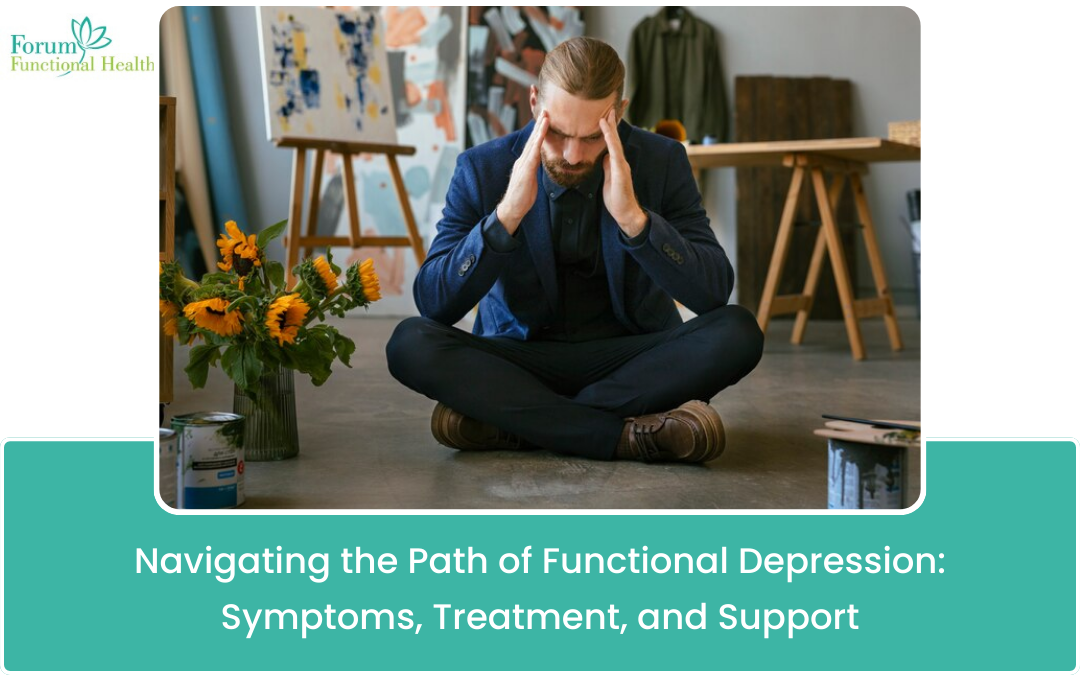
by Forum Functional Health Center | Oct 23, 2024 | Erectile Dysfunction
Erectile dysfunction (ED) can be an emotionally challenging condition, affecting not only the person suffering but also their partner. For many men, it’s not just about the physical impact; it’s also about how erectile dysfunction affects a woman emotionally and within relationships. If you or your partner are struggling with ED, this guide offers a thorough understanding of the available treatments, ranging from temporary fixes to permanent solutions. In Texas, advanced options such as those at the Functional Health Center provide hope for overcoming this condition.
Understanding Erectile Dysfunction: What Causes It?
Before diving into treatments, it’s important to understand what causes erectile dysfunction. ED can be triggered by physical conditions such as heart disease, diabetes, and hormonal imbalances, as well as psychological factors like stress and anxiety. These root causes determine the appropriate course of treatment, whether you’re asking, “Is erectile dysfunction permanent?” or if it can be managed with lifestyle changes.
Can Erectile Dysfunction Be Cured?
A common question men ask is, “Can erectile dysfunction be cured?” The answer depends on the underlying cause. For some men, ED is a temporary issue caused by stress or medication side effects, while for others, it might be a more permanent condition due to chronic health issues. However, many advances in modern medicine now offer effective solutions, and there are even cases where a permanent cure for erectile dysfunction has been achieved through a combination of medical treatments and lifestyle adjustments.
Temporary Solutions for Erectile Dysfunction
For those seeking immediate relief, several erectile dysfunction treatments offer temporary solutions. These include:
- Oral Medications: Drugs like Viagra, Cialis, and Levitra help increase blood flow to the penis, enabling erections during sexual stimulation. These medications are often the first line of defense and provide relief for several hours.
- Vacuum Erection Devices: These devices help stimulate an erection by using suction. While effective for temporary use, they may not feel natural or comfortable for some men.
- Injection Therapy: For men who do not respond to oral medications, penile injections can be an alternative. This method directly stimulates the blood flow to the penis, offering temporary erections.
While these options can offer quick fixes, they do not address the root causes of erectile dysfunction and may require consistent use over time.
Permanent Erectile Dysfunction Treatments
For those seeking a more lasting solution, there are several treatments designed to offer a permanent cure for erectile dysfunction. These include:
- Lifestyle Changes: Sometimes, ED can be reversed by improving your health. Losing weight, exercising, reducing alcohol consumption, and quitting smoking are all lifestyle changes that can significantly improve erectile function.
- Hormone Therapy: If ED is due to low testosterone, hormone replacement therapy might be recommended. This therapy balances hormones and can help restore erectile function over time.
- Penile Implants: For men who do not respond to less invasive treatments, penile implants are a more permanent solution. This surgical option involves placing a device inside the penis that allows for controlled erections.
- Platelet-Rich Plasma (PRP) Therapy: Some clinics, like the Erectile Dysfunction Treatment in McKinney, TX, offer PRP therapy. This regenerative therapy uses your blood to promote healing and improve erectile function naturally.
Emotional Impact: How Erectile Dysfunction Affects a Woman
While the focus is often on the man’s physical health, it’s crucial to acknowledge how erectile dysfunction affects a woman. Partners may feel a range of emotions, including frustration, confusion, or even guilt. Open communication is essential in maintaining emotional intimacy and addressing the impact ED has on both partners. Seeking support together, whether through counseling or medical appointments, can help manage the emotional strain.
The Role of Functional Health Centers in ED Treatment
One of the best places to seek comprehensive care is the Functional Health Center in Texas. Clinics like this take a holistic approach, addressing not just the symptoms of ED but the underlying health conditions that contribute to it. With personalized care and state-of-the-art treatment options, patients can access a wide range of therapies tailored to their specific needs.
Seeking Help: When to Visit a Specialist
If you or your partner are dealing with persistent ED, it’s time to consult a specialist. Facilities offering erectile dysfunction treatment in McKinney, TX, provide cutting-edge solutions for lasting results. Don’t hesitate to seek professional help, as early intervention can prevent further complications and improve your physical and emotional well-being.
Conclusion: Hope for Men and Their Partners
Erectile dysfunction can be a challenging condition, but there are numerous erectile dysfunction treatments available, ranging from temporary fixes to permanent solutions. Whether you’re looking for immediate relief or a long-term solution, clinics like the Functional Health Center in Texas offer personalized care to address both physical and emotional aspects of ED. With the right treatment plan, you and your partner can overcome this challenge and regain your confidence. Contact Forum Functional Health Center in McKinney, TX.
Read more Details: Navigating the Path of Functional Depression: Symptoms, Treatment, and Support

by Forum Functional Health Center | Oct 21, 2024 | Depression
Functional depression, often characterized by a persistent feeling of sadness while still maintaining daily responsibilities, is a mental health challenge that many people face. It’s essential to recognize the functional depression symptoms, explore effective treatment options, and understand the support available to those struggling. This guide will help you navigate the complexities of functional depression, fostering a deeper understanding of its signs, treatment approaches, and resources for recovery.
What Is Functional Depression?
Functional depression, sometimes referred to as high-functioning depression, allows individuals to carry out their daily tasks while concealing their emotional struggles. Although they might appear to be managing well, internally they may experience overwhelming sadness, fatigue, and a sense of hopelessness.
Common Signs of Functional Depression
Understanding the signs of functional depression is crucial for early identification and intervention. Here are some common symptoms:
- Chronic Sadness: An ongoing feeling of sadness that doesn’t seem to improve, even during positive experiences.
- Fatigue: A constant sense of tiredness that doesn’t improve with rest.
- Difficulty Concentrating: Trouble focusing on tasks, leading to decreased productivity at work or home.
- Emotional Numbness: A lack of interest or pleasure in activities once enjoyed.
- Social Withdrawal: Pulling away from friends and family, leading to feelings of isolation.
- Irritability: Increased irritability or mood swings, which can strain relationships.
If you recognize these signs in yourself or someone you care about, it’s crucial to seek help. Resources such as the Functional Health Center in Texas can provide the necessary support.
Effective Treatment Options
Finding the right treatment for functional depression can significantly enhance your quality of life. Here are several approaches that can help:
- Psychotherapy
Psychotherapy, particularly Cognitive Behavioral Therapy (CBT), is often a key component in treating functional depression. CBT helps individuals identify and challenge negative thought patterns, promoting healthier coping mechanisms. This therapeutic approach empowers you to take control of your thoughts and emotions.
- Medication
For some, medication may be necessary to alleviate symptoms. Antidepressants can help balance neurotransmitters in the brain, making it easier to manage feelings of sadness and hopelessness. It’s vital to consult with a healthcare professional to find the most appropriate medication and dosage for your unique situation.
- Lifestyle Changes
Making healthy lifestyle choices can have a significant impact on your mental health. Here are some beneficial strategies:
- Regular Exercise: Physical activity releases endorphins, which can improve mood and overall well-being.
- Balanced Diet: A nutritious diet can positively affect your mental state and provide the energy needed for daily activities.
- Adequate Sleep: Prioritizing sleep hygiene helps improve mood and cognitive function.
- Support Groups
Joining a support group can provide a safe space to share experiences with others who understand what you’re going through. These groups can offer emotional support, encouragement, and coping strategies from peers who share similar challenges.
- Mindfulness and Natural Remedies
Some individuals find relief through mindfulness practices such as meditation, yoga, or deep breathing exercises. Natural supplements, such as St. John’s Wort or omega-3 fatty acids, may also be beneficial, but it’s essential to consult with a healthcare professional before starting any new supplement.
Seeking Help in Texas
If you’re in Texas and are looking for Texas Depression help, the Forum Functional Health Center offers specialized treatment for those dealing with functional depression. Their team is dedicated to providing personalized care and support tailored to individual needs.
- Comprehensive Assessment
At the Forum Functional Health Center, a comprehensive assessment is conducted to understand your unique experiences and challenges. This assessment helps create a customized treatment plan that addresses your specific symptoms and goals.
- Holistic Approach to Treatment
The center adopts a holistic approach, recognizing that mental health is interconnected with physical health. This means your treatment plan may include a combination of therapy, medication, lifestyle changes, and natural remedies to promote overall well-being.
- Ongoing Support and Guidance
Recovery is a journey, and ongoing support is vital. The team at the Forum Functional Health Center provides continuous guidance and encouragement, helping you navigate the ups and downs of recovery. They strive to ensure you feel understood and supported throughout your healing process.
Taking the First Step Toward Recovery
Recognizing functional depression in yourself or a loved one is a significant step toward recovery. It’s important to remember that seeking help is a sign of strength, not weakness. Whether reaching out to a therapist, joining a support group, or exploring treatment options, taking action is essential for healing.
Get the Help You Need
If you or someone you know is experiencing functional depression, don’t hesitate to reach out for assistance. The Forum Functional Health Center provides valuable resources and support for those seeking depression treatment in McKinney, TX. Their team is ready to help you on your journey toward healing.
Conclusion
Navigating the path of functional depression can be daunting, but with the right support and treatment, recovery is possible. By understanding its symptoms, exploring effective treatment options, and connecting with the right resources, you can take charge of your mental health. Remember, you are not alone in this journey, and there is help available. Taking the first step is the beginning of a new chapter in your life. Contact Forum Functional Health in McKinney, TX.
Read More Details: What Are the Best Treatment Options for Female Infertility?

by Forum Functional Health Center | Oct 18, 2024 | Uncategorized
Female infertility is an emotional journey that affects not just the body but also the mind and spirit. Many women face this challenge, wondering if they’ll ever be able to conceive. Understanding the underlying causes, particularly hormonal imbalances such as Polycystic Ovary Syndrome (PCOS), is key to unlocking treatment options that offer hope. In this post, we’ll explore the causes, types of infertility, and the best treatment options available at the Forum Functional Health Center, including solutions for hormonal imbalances in McKinney, TX.
Understanding Female Infertility
Female infertility can be overwhelming, especially when the reasons behind it are unclear. Infertility is generally defined as the inability to conceive after one year of trying. There are two main types of infertility:
- Primary Infertility – This refers to women who have never been able to conceive.
- Secondary Infertility – This occurs when a woman has conceived in the past but is unable to do so again.
Why Does PCOS Cause Infertility?
Polycystic Ovary Syndrome (PCOS) is one of the most common reasons for female infertility. PCOS is a hormonal imbalance in which the ovaries produce too many androgens (male hormones). This imbalance disrupts ovulation, making it difficult for eggs to mature and be released. This hormonal condition also affects the regularity of menstrual cycles, often challenging conception.
Many women with PCOS ask, “Why does PCOS cause infertility?” The answer lies in the hormonal imbalance it creates. Without regular ovulation, the chances of getting pregnant decrease significantly, leading to frustration, stress, and even feelings of hopelessness.
Best Treatment Options for Female Infertility
Thankfully, female infertility, including cases linked to PCOS, can often be treated effectively. Here are some of the best treatment options available, particularly for women seeking care at the Functional Health Center in Texas:
- Lifestyle Modifications
Small lifestyle changes can have a big impact on fertility, especially for women dealing with PCOS. Weight management through a balanced diet and regular exercise can help regulate hormonal levels, improving ovulation and boosting fertility. It’s often the first step doctors recommend.
- Medications for Ovulation
For women with hormonal imbalances such as PCOS, medications like Clomiphene Citrate and Letrozole are commonly prescribed. These medications stimulate the ovaries to release eggs, increasing the chances of conception. These drugs can be incredibly effective, especially when combined with lifestyle changes.
- Assisted Reproductive Technologies (ART)
Treatments such as In Vitro Fertilization (IVF) and Intrauterine Insemination (IUI) are advanced procedures that help women who cannot conceive naturally. These options are available at centers like the Forum Functional Health Center, where specialized treatment for infertility is provided.
- Hormonal Treatment
Women suffering from hormonal imbalances, such as thyroid disorders or PCOS, may require hormonal treatments. These treatments can regulate the reproductive hormones, helping to restore ovulation and increase fertility. This approach often includes hormone replacement therapy (HRT) or insulin-sensitizing agents.
- Surgery
In some cases, surgery may be necessary to treat structural problems like blocked fallopian tubes or endometriosis, which can hinder conception. These procedures are typically minimally invasive and aim to restore fertility by correcting physical barriers to conception.
Emotional Support Through the Infertility Journey
Dealing with infertility can be emotionally taxing. Many women experience anxiety, stress, and even depression as they navigate this complex issue. It’s important to remember that you are not alone. Seeking emotional support through therapy or support groups can be incredibly beneficial for mental health. At the Functional Health Center in Texas, the team not only addresses the physical aspects of infertility but also understands the emotional weight it carries, offering comprehensive support throughout the treatment journey.
Hormonal Imbalances and Female Infertility Treatment in McKinney, TX
If you’re struggling with infertility caused by hormonal imbalances, the Treatment for Female Infertility & Hormonal Imbalances in McKinney, TX offers a range of personalized treatments. Whether you are dealing with PCOS or another hormonal disorder, the goal is to create a tailored plan that addresses your unique needs, so you can increase your chances of conceiving and achieving the family you’ve been dreaming of.
Conclusion: There is Hope for Women Facing Infertility
Infertility, especially when caused by hormonal imbalances like PCOS, can be a challenging and emotional journey. However, there are numerous treatment options available, from lifestyle changes and medication to advanced procedures like IVF. The Forum Functional Health Center in Texas offers a comprehensive approach to treatment, supporting women physically and emotionally through this process. With the right guidance and care, there is hope for those looking to overcome infertility. Contact Us Forum Functional Health.
Read More: What Are the Most Effective Strategies for Fatigue from Ozempic?

by Forum Functional Health Center | Oct 16, 2024 | Fatigue
If you’ve started using Ozempic, you’re likely aware of its benefits in managing blood sugar levels and supporting weight loss. However, some individuals experience side effects, such as fatigue. Feeling unusually tired can interfere with your daily routine, leaving you searching for solutions.
This article will explore how to overcome Ozempic fatigue with practical strategies. We’ll also uncover factors like high cholesterol and how they contribute to low energy levels. If you’re looking for personalized support, Fatigue Treatment in McKinney, TX is available to help you feel your best.
What is Ozempic Fatigue, and Why Does It Happen?
Ozempic (semaglutide) is a GLP-1 receptor agonist used to treat type 2 diabetes and promote weight loss. While it offers significant health benefits, fatigue is one of its more common side effects. Many users report that soon after starting the medication, they feel drained.
Fatigue from Ozempic can be caused by:
- Fluctuating blood sugar levels during the adjustment period.
- Dehydration and reduced appetite, make it hard to consume enough calories.
- Changes in metabolic processes, leave the body temporarily struggling to adapt.
How Long Does Ozempic Fatigue Last?
The duration of Ozempic fatigue varies. For some, it may only last a few days, while others may experience it for a few weeks. As your body adjusts to the medication, fatigue generally subsides. However, if it persists, consulting a healthcare provider is essential. You may need to adjust your dose or explore complementary treatments.
Can High Cholesterol Cause Fatigue?
Yes, high cholesterol can cause fatigue. When cholesterol levels are elevated, plaque buildup in arteries can reduce blood flow, causing the heart to work harder to pump oxygen-rich blood. This strain leads to exhaustion and low energy levels over time. Managing cholesterol through diet, exercise, and medications can significantly boost energy levels.
5 Effective Strategies to Combat Fatigue from Ozempic
Here are some strategies to help you fight fatigue and regain your energy:
- Stay Hydrated
Ozempic can suppress appetite, making it easy to forget to drink water. Dehydration is a common cause of tiredness. Aim to drink at least 8-10 glasses of water daily to stay hydrated. Electrolyte-rich drinks can also help restore balance if you feel lightheaded.
- Focus on Balanced Nutrition
Although Ozempic curbs hunger, it’s important to nourish your body. Include:
- Complex carbs for sustained energy (oats, brown rice, sweet potatoes).
- Healthy fats from nuts, seeds, and avocados.
- Lean protein sources like chicken, fish, and tofu support muscle function.
If you need a personalized nutrition plan to combat fatigue, visit the Functional Health Center in Texas.
- Improve Sleep Quality
Fatigue can worsen if you’re not getting enough quality sleep. Develop a consistent bedtime routine by:
- Going to bed and waking up at the same time daily.
- Limiting screen time before bed to encourage better melatonin production.
- Creating a restful environment—dark, quiet, and cool.
- Monitor Your Blood Sugar Levels
Since Ozempic affects glucose metabolism, closely monitoring your blood sugar is essential. Fluctuating levels can lead to low energy. Eating smaller, more frequent meals can stabilize blood sugar and prevent energy dips.
- Seek Functional Health Support
If fatigue persists despite your best efforts, consider Fatigue Treatment in McKinney, TX. The experts at the Functional Health Center in Texas offer comprehensive evaluations to uncover the root cause of fatigue, whether it’s related to Ozempic, high cholesterol, or another underlying health issue.
Why Choose a Functional Approach to Fatigue Treatment?
A functional health approach focuses on treating the root cause of fatigue rather than just addressing the symptoms. Specialists explore all contributing factors—blood sugar levels, hormonal imbalances, nutrition, and mental health. This personalized approach ensures lasting improvements in your energy levels.
If you’re in Texas and struggling with ongoing fatigue, contact the Functional Health Center in Texas for expert care and guidance. They offer cutting-edge treatments tailored to help you restore your vitality.
Final Thoughts
Managing Ozempic fatigue may seem challenging, but with the right strategies, you can reclaim your energy and well-being. Hydration, nutrition, quality sleep, and monitoring your health are all essential steps. If fatigue persists, seek personalized Fatigue Treatment in McKinney, TX for specialized care.
Feeling energized and healthy isn’t just a dream—it’s within reach. Start taking proactive steps today and embrace the benefits of Ozempic while minimizing the challenges. Please Contact us a Forum Function Health in McKinney,TX.
This post will help readers gain actionable insights on managing fatigue and inspire them to seek professional care when needed. The balance of practical advice and emotional connection encourages engagement while keeping SEO best practices in mind.
Read More: How to Know If You Need Hormonal Imbalance Treatment

by Forum Functional Health Center | Oct 14, 2024 | Hormone Health
Your hormones play a vital role in keeping your body balanced. From metabolism and sleep cycles to mood and reproductive health, even a slight hormonal disruption can cause various symptoms. If you’re experiencing unexpected weight changes, fatigue, or mood swings, it could be time to seek hormonal imbalance treatment in McKinney, TX.
In this blog, we’ll dive into common signs of hormonal imbalance, its potential causes, and when to reach out to professionals like Forum Functional Health Center for personalized care.
What is Hormonal Imbalance?
A hormonal imbalance occurs when there is too much or too little of a hormone circulating in your bloodstream. Even minor shifts in hormone levels can have significant effects on your well-being. The most common hormones affected include insulin, cortisol, thyroid hormones, estrogen, and testosterone.
Hormonal disruptions can affect anyone at any age, though they are more common during life phases such as puberty, pregnancy, or menopause.
Key Signs You Might Need Hormonal Imbalance Treatment in McKinney, TX
If you’re not sure whether you need professional intervention, here are some symptoms that may indicate it’s time to visit a Functional Health Center in Texas:
- Unexplained Fatigue
Do you feel tired even after a full night’s sleep? Fatigue is a common sign of hormonal imbalance, particularly with thyroid dysfunction or elevated cortisol (the stress hormone). Persistent tiredness can interfere with your daily activities and make it hard to stay productive.
- Weight Fluctuations
Are you gaining or losing weight without any major lifestyle changes? Hormones regulate metabolism and appetite, so imbalances—especially in insulin or thyroid hormones—can lead to sudden weight shifts. If your weight change feels uncontrollable, it’s worth considering hormonal imbalance treatment in McKinney, TX.
- Mood Swings and Anxiety
Hormones like serotonin and estrogen directly influence mood. If you’re experiencing unexpected mood swings, anxiety, or depression, it could be a result of hormonal fluctuations. Such emotional changes often signal the need for targeted care from professionals like Forum Functional Health Center.
- Sleep Problems
Struggling to fall or stay asleep? Hormones such as melatonin regulate sleep cycles. Cortisol spikes can also keep your body in a state of high alert, disrupting your sleep pattern. Consistent sleep disturbances may indicate a hormonal imbalance requiring expert attention.
- Reproductive Health Issues
Hormonal imbalances can cause irregular periods, fertility challenges, or low libido. Both men and women may experience disruptions in reproductive health, including symptoms like erectile dysfunction or painful menstrual cycles.
What Causes Hormonal Imbalance?
Several factors can trigger hormonal imbalances, including:
- Chronic Stress: High-stress levels increase cortisol production, affecting other hormone levels.
- Poor Diet: A lack of essential nutrients can disrupt your endocrine system.
- Environmental Factors: Exposure to toxins or endocrine-disrupting chemicals may impact hormone production.
- Aging: Natural hormone shifts occur during menopause, andropause, and other life stages.
- Medical Conditions: Autoimmune disorders, PCOS, and thyroid diseases are common culprits.
If any of these factors resonate with you, it’s essential to consult with experts at a Functional Health Center in Texas.
Why Choose Forum Functional Health Center for Hormonal Imbalance Treatment?
Forum Functional Health Center focuses on understanding the root causes of hormonal imbalances, not just treating the symptoms. Their patient-centered approach ensures each individual receives personalized care based on a thorough evaluation.
The center offers advanced diagnostic tools and comprehensive treatment plans, from lifestyle guidance to targeted hormone therapy. Whether you’re dealing with thyroid issues, adrenal fatigue, or reproductive health concerns, their team can design a plan that works best for you.
What to Expect During Your Hormonal Imbalance Treatment in McKinney, TX
When you seek care at Forum Functional Health Center, the process typically involves:
- Initial Consultation: A detailed discussion about your symptoms, lifestyle, and medical history.
- Advanced Testing: Blood tests and other assessments to determine hormone levels and pinpoint imbalances.
- Customized Treatment Plan: A combination of nutrition, stress management, supplementation, and, if necessary, hormone therapy.
- Ongoing Support: Regular follow-ups to monitor progress and make any needed adjustments to your plan.
The Importance of Early Intervention
Ignoring hormonal imbalances can lead to more severe health issues, such as metabolic disorders, cardiovascular diseases, or chronic fatigue syndrome. The earlier you address your symptoms, the better your chances of restoring hormonal harmony and improving your overall quality of life.
Taking proactive steps can help you regain control of your health. If you’re experiencing any of the signs mentioned above, don’t wait—reach out to professionals for hormonal imbalance treatment in McKinney, TX today.
Conclusion: Take Charge of Your Health Today
Living with a hormonal imbalance can feel overwhelming, but you don’t have to do it alone. At Forum Functional Health Center, you’ll receive the care and attention you deserve to restore balance and vitality to your life. From fatigue and weight issues to mood swings and reproductive health concerns, their experienced team will guide you every step of the way.
Take the first step toward better health—explore your options at a Functional Health Center in Texas and schedule your consultation for hormonal imbalance treatment in McKinney, TX today! Contact Forum Function Health and McKinney,TX
Read More: How Do You Know When Perimenopause Is Ending?

by Forum Functional Health Center | Oct 11, 2024 | Uncategorized
Perimenopause is a phase in a woman’s life marked by significant changes. It’s the transition period leading up to menopause, characterized by fluctuating hormones that cause various symptoms like hot flashes, irregular periods, mood swings, and more. While it’s a natural phase, knowing when perimenopause is ending can be confusing, as symptoms vary for each woman. Let’s dive into the signs of the final stages of perimenopause and what to expect as you transition to menopause.
Understanding Perimenopause and Menopause
Perimenopause typically starts in a woman’s 40s, though it can begin earlier or later. It lasts for an average of four years but can extend up to a decade for some women. The end of perimenopause is marked by a significant milestone: no menstrual period for 12 consecutive months. Once this occurs, a woman is considered to be in menopause.
However, before reaching that milestone, it’s important to understand the symptoms that indicate you’re nearing the end of perimenopause. Knowing what to expect can help you better manage the changes and explore treatment options, such as those offered at a Functional Health Center in Texas, for personalized care during this time.
Key Symptoms Indicating Perimenopause Is Ending
- Longer Gaps Between Periods:
One of the most noticeable signs that perimenopause is ending is the increasing length of time between your periods. While irregular periods are common throughout perimenopause, as you near the end, they may become less frequent, sometimes with months between cycles. If you’ve gone a full 12 months without menstruating, this is a definitive sign that menopause has begun.
- Reduction in Hot Flashes and Night Sweats:
Many women experience a decrease in hot flashes and night sweats as perimenopause comes to a close. While these symptoms can still occur in menopause, they often become less intense toward the end of perimenopause. Some women even find that their hormone levels stabilize slightly during this transition, offering brief relief before menopause fully sets in.
- Emotional Stability Begins to Improve:
Emotional ups and downs, mood swings, and irritability are common symptoms throughout perimenopause due to fluctuating hormone levels. However, as perimenopause ends, these emotional changes often begin to subside. You may notice more emotional stability as your body adjusts to its new hormonal state.
- Changes in Sleep Patterns:
Sleep disturbances, including insomnia or restless sleep, are common during perimenopause. However, as hormone levels settle toward the end of perimenopause, you may experience more consistent and restful sleep. While sleep patterns vary, noticing an improvement can be a positive indicator that perimenopause is winding down.
- Lowered Libido:
A decrease in libido or sexual desire is common as estrogen levels drop in perimenopause. This can continue into menopause, but for some women, this decline is most noticeable in the later stages of perimenopause. If you experience a significant change in sexual desire or vaginal dryness, it may be time to consult a healthcare provider for hormonal imbalance treatment options.
Seeking Support for Hormonal Imbalance
If you’re nearing the end of perimenopause and struggling with severe symptoms, seeking professional care can make all the difference. A Functional Health Center in Texas can provide personalized support, helping you manage the hormonal imbalances that arise during this transitional phase. Treatments such as hormone therapy or natural supplements may help ease the symptoms of perimenopause and prepare you for the next stage.
Managing Perimenopause Symptoms with Treatment
Perimenopause is a time of hormonal imbalance, and for many women, the symptoms can be overwhelming. If you’re experiencing severe symptoms, such as debilitating hot flashes, mood swings, or sleep disturbances, it may be beneficial to explore options for hormonal imbalance treatment. The Hormonal Imbalance Treatment in McKinney, TX provides personalized care to help balance hormone levels, reduce symptoms, and improve quality of life as you transition into menopause.
At Forum Functional Health Center, treatments are designed to target the root causes of your symptoms, using natural and holistic methods where possible. With a combination of bioidentical hormone therapy, dietary changes, and lifestyle modifications, these treatments aim to restore balance and reduce discomfort.
Final Thoughts on the End of Perimenopause
The end of perimenopause can be a confusing time, filled with physical and emotional changes. However, understanding the signs that perimenopause is ending can give you a clearer picture of what’s happening in your body. Remember that no two women experience perimenopause in the same way, so it’s essential to listen to your body and seek guidance from professionals who specialize in hormonal imbalance treatment.
If you’re struggling with perimenopause symptoms or unsure how to manage the transition, don’t hesitate to contact a Functional Health Center in Texas. Their team can provide comprehensive care and guide you through this important stage of life with the right tools and treatments tailored to your needs.
Managing this transition with the right support can help you embrace the next chapter of your life with confidence and wellness. Stay informed, seek professional help, and remember—you are not alone on this journey.
Conclusion
Perimenopause can feel like an unpredictable time, but knowing the signs that it’s ending allows you to take control and prepare for the next stage—menopause. If you notice extended gaps between periods, fewer hot flashes, improved emotional stability, or changes in sleep patterns, these may be signs that perimenopause is coming to an end. To make this transition smoother, seeking professional guidance from the experts at a Functional Health Center in Texas can help balance your hormones and improve your well-being.
Read More: What Are the Best PCOS Treatment Options in McKinney, TX?

by Forum Functional Health Center | Oct 9, 2024 | Polycystic ovary syndrome (PCOS)
Polycystic ovary syndrome (PCOS) is a common hormonal disorder that affects many women of reproductive age. It can bring a range of symptoms, including irregular periods, weight gain, acne, and infertility, which can profoundly impact one’s physical and emotional well-being. If you’re searching for effective Polycystic ovary syndrome (PCOS) Treatment in McKinney, TX, you’re not alone. Many women face similar challenges, and finding the right support can make all the difference.
In this blog post, we’ll explore the best treatment options available at the Forum Functional Health Center, a leading Functional Health Center in Texas, dedicated to providing personalized care and support for women battling PCOS.
Understanding PCOS: A Holistic Approach
Before delving into treatment options, it’s crucial to understand what PCOS is and how it affects your body. PCOS is characterized by hormonal imbalances that can lead to metabolic issues. Women with PCOS often experience insulin resistance, which makes weight management more challenging. It’s important to address these hormonal imbalances holistically to achieve lasting results.
At the Forum Functional Health Center, we believe in treating the root causes of PCOS rather than just managing symptoms. Our approach combines traditional and alternative therapies, ensuring comprehensive care tailored to your needs.
- Nutritional Therapy: Fueling Your Body Right
Nutrition plays a pivotal role in managing PCOS symptoms. A balanced diet can help regulate hormones, improve insulin sensitivity, and support overall health. At the Functional Health Center in Texas, we emphasize the importance of whole foods, focusing on:
- Lean Proteins: Include chicken, fish, beans, and legumes.
- Healthy Fats: Incorporate avocados, nuts, and olive oil.
- Fiber-Rich Foods: Eat plenty of fruits, vegetables, and whole grains to aid digestion and regulate blood sugar levels.
Working with a nutritionist can help you create a personalized meal plan that addresses your health goals while considering your lifestyle preferences.
- Exercise: Movement for Hormonal Balance
Physical activity is another critical component in managing PCOS. Regular exercise helps maintain a healthy weight, improves insulin sensitivity, and reduces stress levels. At the Forum Functional Health Center, we recommend incorporating a mix of:
- Cardiovascular Exercises: Walking, running, and cycling can help burn calories and improve heart health.
- Strength Training: Building muscle mass boosts metabolism, making it easier to manage weight.
- Mind-Body Practices: Yoga and Pilates can reduce stress and promote hormonal balance, creating a holistic approach to your treatment.
Even small changes, like taking daily walks or engaging in group classes, can make a significant difference in how you feel physically and emotionally.
- Hormonal Treatments: Regulating Your Cycle
For many women with PCOS, hormonal treatments are necessary to regulate menstrual cycles and address other symptoms. Common options include:
- Birth Control Pills: These can help manage irregular periods and reduce acne and excess hair growth.
- Hormonal Therapies: Medications like spironolactone can help manage symptoms by addressing hormonal imbalances.
- Fertility Treatments: If you’re struggling with infertility, treatments like Clomiphene citrate may be recommended.
At the Forum Functional Health Center, we offer individualized hormonal assessments to determine the best treatment options for your specific situation.
- Supplements: Supporting Your Health Naturally
Certain supplements can provide additional support for women with PCOS. Some popular options include:
- Inositol: Known to improve insulin sensitivity and ovarian function.
- Omega-3 Fatty Acids: These can help reduce inflammation and improve heart health.
- Vitamin D: Often deficient in women with PCOS, Vitamin D is essential for hormone regulation.
Before starting any supplement regimen, it’s important to consult with a healthcare professional to determine what is right for you.
- Stress Management: Finding Your Balance
Living with PCOS can be emotionally challenging, and managing stress is crucial for overall well-being. Stress can exacerbate hormonal imbalances, making it essential to find effective coping strategies. Consider incorporating practices like:
- Mindfulness and Meditation: These techniques can help calm your mind and reduce stress.
- Therapy or Support Groups: Connecting with others who understand your struggles can provide emotional support and guidance.
- Journaling: Writing about your experiences can help you process emotions and reflect on your journey.
The Forum Functional Health Center offers resources and workshops focused on stress management, providing you with tools to navigate the emotional challenges of PCOS.
- Personalized Care: Your Journey to Health
At the Functional Health Center in Texas, we understand that each woman’s experience with PCOS is unique. Our team is dedicated to providing personalized care that addresses your specific needs. We take the time to listen to your concerns and work collaboratively to develop a comprehensive treatment plan that empowers you to take charge of your health.
Conclusion: A New Beginning Awaits
Finding the right Polycystic ovary syndrome (PCOS) Treatment in McKinney, TX, can be a transformative journey. At the Forum Functional Health Center, we are committed to supporting you every step of the way. Our holistic approach, focusing on nutrition, exercise, hormonal balance, and emotional well-being, can help you reclaim control over your health and live your best life.
If you’re ready to explore your treatment options, we invite you to contact us today. Your journey to improved health and well-being starts here!
For more information, visit our website: Forum Functional Health Center, and learn about our Polycystic ovary syndrome (PCOS) Treatment in McKinney, TX. Let us help you take the first step towards a healthier, happier you! Contact Froum Functional Health in Mckinney, TX.
Read More: What Are the Most Effective Treatments for Thyroid Disease?

by Forum Functional Health Center | Oct 7, 2024 | Erectile Dysfunction
Thyroid disease affects millions of people worldwide, causing a range of symptoms that can impact every part of life. From fatigue and weight gain to mood swings and brain fog, living with a thyroid disorder can be frustrating and overwhelming. Thankfully, there are effective treatments available to help you regain control of your health and well-being.
If you’re struggling with thyroid issues, it’s important to know that you’re not alone. The Forum Functional Health Center offers personalized, holistic care for those seeking relief from thyroid disease, focusing on root causes and long-term healing.
Understanding Thyroid Disease: Symptoms and Challenges
The thyroid is a small, butterfly-shaped gland in your neck that greatly regulates your metabolism. When the thyroid malfunctions, it can produce too much thyroid hormone (hyperthyroidism) or too little (hypothyroidism). Both conditions can wreak havoc on your body, leading to a wide range of symptoms:
- Hypothyroidism: Fatigue, weight gain, depression, constipation, and cold intolerance.
- Hyperthyroidism: Anxiety, rapid heartbeat, weight loss, tremors, and sweating.
Living with these symptoms can be incredibly challenging. Many people feel misunderstood or dismissed by healthcare providers who focus only on managing symptoms rather than addressing the underlying cause of thyroid disease. This is where personalized care from a Functional Health Center in Texas can make a world of difference.
Holistic Approaches to Thyroid Disease Treatment
Conventional medicine often treats thyroid disease with hormone replacement therapy or medications to suppress thyroid function. While these treatments can be effective, they don’t always address the root causes of the disorder. A Functional Health Center in Texas takes a different approach, looking at the body as a whole and focusing on natural ways to support thyroid function.
- Diet and Nutritional Support
What you eat plays a significant role in managing thyroid health. Many people with thyroid disease benefit from a specialized diet that supports their immune system and reduces inflammation. Nutritional deficiencies, especially in iodine, selenium, and zinc, can worsen thyroid problems. Working with a professional at the Forum Functional Health Center, you can receive a customized nutrition plan to help restore balance and improve thyroid function.
- Hormone Balancing
For those with hypothyroidism, thyroid hormone replacement therapy may be necessary. This involves taking synthetic or natural thyroid hormones to regulate hormone levels in the body. Patients are often frustrated when their hormone levels fluctuate, causing inconsistent symptom relief. At the Functional Health Center in Texas, your care team will closely monitor your hormone levels and adjust treatment as needed to ensure stability and comfort.
- Stress Management Techniques
Stress is a major trigger for thyroid imbalances. Chronic stress can interfere with thyroid function and exacerbate symptoms. The Forum Functional Health Center provides various stress-relief strategies, including meditation, yoga, and counseling, to help manage stress levels. Finding ways to lower your stress can greatly improve your feelings and promote better overall health.
- Supplements and Herbal Support
Certain supplements, like selenium, magnesium, and omega-3 fatty acids, can support thyroid health. Herbs such as ashwagandha and guggul have also been shown to help balance thyroid hormones naturally. It’s important to consult with your healthcare provider before starting any supplements, as they can interact with medications. A functional health practitioner can provide guidance and create a supplement plan tailored to your needs.
The Role of the Forum Functional Health Center
The Forum Functional Health Center offers integrative and natural thyroid disease treatments. By addressing the root causes of your condition and providing a personalized treatment plan, the center helps you sustainably regain your health.
Located in McKinney, Texas, the Thyroid Disease Treatment in McKinney, TX focuses on healing the whole person, not just the thyroid. Through comprehensive testing and tailored treatments, the center provides effective solutions for those dealing with hypothyroidism, hyperthyroidism, Hashimoto’s thyroiditis, and other thyroid-related conditions. Their holistic approach gives you the tools and support you need to feel empowered on your health journey.
Taking the Next Step Towards Healing
Living with thyroid disease can be overwhelming, but it doesn’t have to control your life. With the right treatments and a supportive care team, you can manage your symptoms and restore balance. At the Functional Health Center in Texas, you’re not just a patient – you’re a person with unique needs, and your health is their priority.
If you’re ready to take control of your thyroid health, consider working with experts who understand your condition on a deeper level. To learn more about thyroid disease treatment options, visit the Functional Health Center in Texas. If you’re specifically looking for treatment in McKinney, TX, check out the comprehensive care offered at Thyroid Disease Treatment in McKinney, TX. You deserve to feel your best again, and the path to healing starts with the right care. Please Contact Forum Functional Health Center in McKinney, TX.
Read More: How Can Stress Affect Your Weight Loss Journey?

by Forum Functional Health Center | Oct 2, 2024 | Weight Management
When it comes to weight loss, most people focus on diet, exercise, and calories. However, one significant factor often overlooked is stress. Stress can have a profound impact on your weight loss efforts, and if left unchecked, it can derail your progress. Understanding the connection between stress and weight loss is crucial, especially when considering treatments like those offered at the Functional Health Center in Texas.
In this blog post, we’ll explore how stress affects weight loss, the science behind it, and how you can overcome these challenges. If you’re on a weight loss journey and struggling, it’s time to dig deeper into the role stress plays in your overall health.
The Stress-Weight Loss Connection
We all experience stress—whether it’s due to work, relationships, or health concerns. However, chronic stress can do more than just make you feel anxious or overwhelmed; it can sabotage your weight loss efforts.
Stress and Cortisol: The Science Behind It
When you’re stressed, your body releases a hormone called cortisol. While cortisol is essential for short-term survival (helping you respond to immediate threats), prolonged elevations in cortisol levels can negatively impact your body. High cortisol levels have been linked to increased appetite, cravings for sugary or fatty foods, and the accumulation of visceral fat around your abdomen.
For those trying to lose weight, this hormonal imbalance can make shedding pounds much harder. The team at the Functional Health Center in Texas understands this complex relationship and incorporates stress management into their comprehensive weight loss strategies.
Stress Eating: A Common Pitfall
One of the most direct ways stress affects weight loss is through emotional eating. When you’re stressed, you might reach for comfort foods, often high in sugar and fat, as a coping mechanism. This type of stress eating provides temporary relief, but it can also lead to weight gain or stall your weight loss progress.
Stress eating is common, but it can be managed with proper treatment and support. The Weight Loss Management Treatment in McKinney, TX offers tailored solutions to help individuals manage stress-induced cravings and emotional eating.
How Stress Affects Metabolism
Not only does stress influence what you eat, but it can also affect how your body processes food. Chronic stress can slow down your metabolism, making it harder to burn calories efficiently. This is why even if you’re eating well and exercising, you might still struggle to lose weight if you’re dealing with high-stress levels.
Additionally, cortisol encourages your body to store fat rather than burn it. When your metabolism slows down and your body stores more fat, losing weight becomes a greater challenge. At the Functional Health Center in Texas, practitioners focus on holistic approaches that address stress management alongside diet and exercise to boost metabolism and facilitate weight loss.
The Impact of Stress on Sleep and Exercise
Stress doesn’t just affect your hormones or eating habits; it also interferes with your sleep and energy levels. Sleep is critical for weight loss because it regulates hunger hormones like leptin and ghrelin. When you’re sleep-deprived due to stress, your hunger hormones get out of balance, causing you to feel hungrier and making it harder to resist cravings.
Moreover, stress can sap your motivation to exercise. When you’re constantly feeling anxious or overwhelmed, you may feel too tired to work out. Unfortunately, this creates a vicious cycle where lack of exercise worsens your stress, making it even harder to achieve your weight loss goals. Incorporating stress management strategies like mindfulness, yoga, or other relaxation techniques can help break this cycle and improve both your mental and physical health. If you’re looking for a comprehensive approach to tackling both weight and stress, check out the Weight Loss Management Treatment in McKinney, TX.
Breaking the Cycle: Managing Stress for Weight Loss Success
If stress is sabotaging your weight loss journey, you’re not alone. Many people struggle to manage stress, but the good news is that there are ways to overcome it. Here are a few tips to help you manage stress and stay on track with your weight loss goals:
- Prioritize Sleep: Aim for 7-9 hours of sleep per night. Good sleep hygiene can help regulate hormones and reduce cravings.
- Practice Mindfulness: Techniques like meditation or deep breathing can help reduce cortisol levels.
- Stay Active: Even if you’re not up for an intense workout, taking a walk or practicing yoga can relieve stress and keep you on track with your fitness goals.
- Seek Professional Help: Sometimes, managing stress requires professional intervention. At the Functional Health Center in Texas, experts can provide a customized approach that addresses both stress and weight loss.
Holistic Weight Loss Solutions at Forum Functional Health Center
At the end of the day, stress is a normal part of life, but it doesn’t have to derail your weight loss journey. By understanding how stress impacts your body and adopting effective stress management techniques, you can overcome these obstacles and achieve your weight loss goals. The Forum Functional Health Center in Texas offers comprehensive, personalized treatments that take into account your unique stressors and how they affect your health.
If you’re ready to take control of your stress and get back on track with your weight loss, consider visiting the Weight Loss Management Treatment in McKinney, TX. Their holistic approach ensures that you’re not just losing weight but improving your overall well-being.
Conclusion
Stress can significantly impact your weight loss journey, from increasing cravings and emotional eating to slowing down your metabolism. But you can regain control by addressing the root causes of stress and working with health professionals. The team at the Functional Health Center in Texas is here to help, offering holistic treatments that address stress and weight loss, ensuring long-term success for your health and wellness goals. Contact Forum Functional Health Center in Mckinney, TX
Read More: Best Hormonal Imbalance Treatment Clinics in McKinney, TX: What Every Woman Should Know

by Forum Functional Health Center | Sep 30, 2024 | Hormone Health
Hormonal imbalances can wreak havoc on a woman’s body, affecting everything from mood and energy levels to overall health. Fortunately, women in McKinney, TX, have access to some of the best hormonal imbalance treatments, offering specialized care to restore balance and vitality. This blog will explore the top options for hormonal imbalance treatment, including personalized care plans and treatments available at leading clinics like the Forum Functional Health Center.
Understanding Hormonal Imbalance in Women
Hormones regulate many essential functions in a woman’s body. When these hormones fall out of balance, it can lead to symptoms like fatigue, weight gain, irritability, irregular periods, and even depression. Women often suffer in silence, attributing these symptoms to stress or aging. However, the right care can make a world of difference.
If you’ve been struggling with symptoms of a hormonal imbalance, finding the best clinic in McKinney, TX, can help you take back control of your life. Whether you’re experiencing thyroid issues, menopause symptoms, or other hormonal disruptions, it’s crucial to seek expert treatment.
Why Choose McKinney, TX for Hormonal Imbalance Treatment?
McKinney, TX is home to a range of advanced clinics dedicated to women’s health, focusing strongly on hormonal imbalance treatment. These clinics understand that hormonal health is critical to overall well-being and provide personalized care to meet the unique needs of every woman.
At clinics like Forum Functional Health Center, patients receive expert assessments that identify the root cause of their hormonal issues. This clinic stands out for its use of considering the whole body and lifestyle when designing treatment plans. If you’re looking for a trusted clinic this center offers an array of effective solutions.
Hormonal Imbalance Treatment in McKinney, TX involves more than just managing symptoms; it’s about restoring balance naturally. This clinic also specializes in addressing related concerns, such as thyroid conditions and adrenal fatigue, through tailored treatments.
Comprehensive Care for Hormonal Imbalance
Whether you’re experiencing hormonal imbalances due to menopause, thyroid issues, or stress, it’s important to choose a clinic that provides comprehensive care. Clinics in McKinney, TX, focus on a variety of treatments, including:
- Hormone Replacement Therapy (HRT): Rebalancing hormones through medically supervised hormone therapy, which may involve bioidentical hormones, can relieve many symptoms like hot flashes, fatigue, and mood swings.
- Nutritional and Lifestyle Guidance: Clinics like Forum Functional Health Center emphasize the importance of nutrition and lifestyle changes in supporting hormone health. Customized dietary plans, stress management, and supplements can have a lasting impact.
- Targeted Supplementation: Natural supplements can effectively address hormonal imbalances. Clinics often recommend supplements that are proven to support estrogen, progesterone, and thyroid function. Patients are empowered to support their health with the right blend of vitamins and minerals.
- Functional Medicine Approach: A Functional Health Center in Texas like Forum offers a holistic view of health, treating hormonal imbalances by looking at the root causes, not just the symptoms. This allows for longer-lasting results that go beyond quick fixes.
Forum Functional Health Center: A Leading Clinic in McKinney, TX
One of the best clinics offering hormonal imbalance treatment in McKinney, TX is the Forum Functional Health Center. This clinic takes a comprehensive approach to women’s hormonal health by addressing underlying causes of imbalances. Their experienced team uses functional medicine to help women regain control of their hormones through:
- Personalized treatment plans
- Hormone level testing and monitoring
- Nutrition and supplement advice
- Lifestyle changes that support hormonal health
Women in McKinney trust the Forum for its compassionate care, holistic approach, and commitment to improving quality of life.
Functional Health Center in Texas provides a safe space where women can seek answers to complex health challenges. By identifying hormone imbalances early, you can prevent further complications and regain your confidence, energy, and well-being.
Choosing the Right Hormonal Imbalance Treatment Clinic
Choosing the right clinic is about finding a team that listens to your symptoms and offers personalized, compassionate care. Women need a clinic that looks beyond the standard protocols and provides innovative solutions that suit their unique bodies.
In McKinney, TX, clinics like Forum Functional Health Center excel at creating tailored treatments that address hormone imbalances naturally. By combining medical expertise with a focus on patient education, these clinics offer women a path toward recovery and restoring balance.
Supplements for Hormonal Imbalances
If you’re dealing with hormone-related issues, supplements may play a key role in your treatment plan. Clinics often recommend natural supplements such as:
- Maca Root: Known for balancing estrogen levels.
- Ashwagandha: Supports adrenal health and helps lower cortisol levels.
- Vitex (Chasteberry): Aids in regulating menstrual cycles and supports progesterone production.
By incorporating these supplements into your routine, you can naturally balance your hormones and enhance your treatment plan.
Regain Control of Your Health Today
If you’re experiencing the symptoms of hormonal imbalance, don’t wait any longer. Reach out to a Functional Health Center in Texas that understands the emotional and physical toll of these issues. The right care can help you feel like yourself again, restoring energy, confidence, and joy to your daily life.
Take the first step towards healing by visiting Forum Functional Health Center in McKinney, TX. Their holistic approach to hormonal imbalance treatment offers long-term relief for women. Contact Forum Functional Health Center
Read More: Can Stress Cause Temporary Erectile Dysfunction? Treatment in Texas










